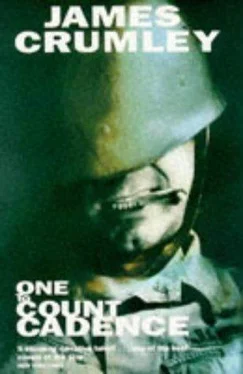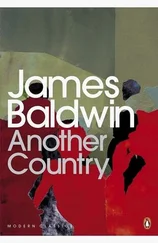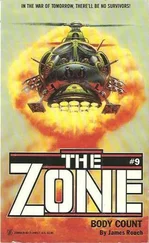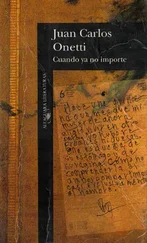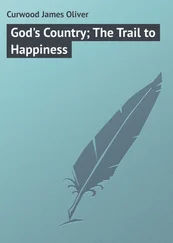James Crumley - One to Count Cadence
Здесь есть возможность читать онлайн «James Crumley - One to Count Cadence» весь текст электронной книги совершенно бесплатно (целиком полную версию без сокращений). В некоторых случаях можно слушать аудио, скачать через торрент в формате fb2 и присутствует краткое содержание. Жанр: Триллер, на английском языке. Описание произведения, (предисловие) а так же отзывы посетителей доступны на портале библиотеки ЛибКат.
- Название:One to Count Cadence
- Автор:
- Жанр:
- Год:неизвестен
- ISBN:нет данных
- Рейтинг книги:3 / 5. Голосов: 1
-
Избранное:Добавить в избранное
- Отзывы:
-
Ваша оценка:
- 60
- 1
- 2
- 3
- 4
- 5
One to Count Cadence: краткое содержание, описание и аннотация
Предлагаем к чтению аннотацию, описание, краткое содержание или предисловие (зависит от того, что написал сам автор книги «One to Count Cadence»). Если вы не нашли необходимую информацию о книге — напишите в комментариях, мы постараемся отыскать её.
One to Count Cadence — читать онлайн бесплатно полную книгу (весь текст) целиком
Ниже представлен текст книги, разбитый по страницам. Система сохранения места последней прочитанной страницы, позволяет с удобством читать онлайн бесплатно книгу «One to Count Cadence», без необходимости каждый раз заново искать на чём Вы остановились. Поставьте закладку, и сможете в любой момент перейти на страницу, на которой закончили чтение.
Интервал:
Закладка:
I wanted to shout it to an indifferent, cowardly world which had, in the name of Utopia, forgotten Valhalla. Or perhaps I only wanted to say it once to myself to be sure I still believed. But I remained silent in the clatter of the bus, thinking myself a fool, a dreamer whose visions were the nightmares of mankind; a fighter not for peace but for eternal war. But I could not stop: I had seen things I could not forget, and remembered things I had never seen. For me the two Siberian armies still stumbled across the snow as they encircled the Germans outside of Stalingrad. There had been no sound track on that film clip, but I had heard them cheer. Flat-faced Siberians ten thousand miles from home, fighting for Russians they didn't like against Germans they didn't know, because it was right for a man to die well, to stand and not run, to fight and perhaps die. But victory is not the only face of war. I also remembered the sad German faces – starving for weeks and freezing for longer – numb with capture, waiting to march further than they had meant to with 107,800 going, and waiting still longer for only six thousand to march back. But the losers did not really look that different from the victors as they marched away to more freezing and fighting and stinking and enduring. I saw and remembered, and God forgive me, thought it noblest of all.
But that was then, riding toward the sea, when I was ashamed of being a warrior.
I dozed fitfully into the city of Dagupan, thankful not to dream, but the bus stopped in the city so we could buy more beer and ice and fresh bread from a little bakery Morning knew. I had no need to leave the bus, so I waited in the heat, watching the town, the corrugated iron roofed, wooden buildings decked with soft drink signs; the people scuffing about in Jesus boots or wooden clogs, seemingly never entering the buildings. Almost all of the buildings were unpainted, but the wood – perhaps because of its own sturdy nature or the heavy, washing rains – refused to look untended. The skin of the people seemed to be the result of some inner brownness, as if their flesh might be earth colored and their bones as delicately hued as ancient ivory keys. There was the brown dust of dirt you find wherever men sweep it out of their houses, but it wasn't filth. That came when the twentieth century god of progress managed to sell itself to the have-not's as salvation, and as a result killed the best of the old society with its worst. If I had asked the teen-aged Filipino outside the bus window, the one with a transistor radio plugged to his head, "Is this progress? These things steal your dignity at the price of your pride." He probably would have answered, "Yeah, man, yeah!" I didn't ask him; and no one asked me.
The others came back from their errands, and we drove the five or six miles to the beach. The bus stopped in front of a large pavilion marked by a neat, freshly painted "JOHN'S," surrounded by the graceful bows of coconut palms, and sitting on a slight rise above the beach and the estuary. Morning greeted the fat Filipino, obviously John, with a true lover-of- real -places familiarity. John, who I'm sure misread Hemingway too, returned the salutations like a true good fellow. John was a fat man who looked very uncomfortable being obese, as if remembering thinness and mourning its passing. He was also queer, and stocked the pavilion not only with a small café, sari-sari store, and a score of weathered tables, but seven or eight Billy Boys in partial drag. Morning introduced me as Sgt. Krummel, Trick Chief, so for the rest of our stay John called me Chief. But he was not nearly as bad as he sounds. His eyes did join his thin smile with some warmth, and refused to shake hands in deference to his sex, as if to say, "I have my boys!" He introduced his boys, Violet, Rose, Magnolia, etc. His place wasn't as out of the way as Morning had led me to believe.
The Trick rented the largest of the nipa huts on the beach and I, childishly, took a smaller hut near it. I wanted to stay away from Morning. The bus drove the couple hundred yards to the hut, but most of the guys walked. I stayed behind to have one of the boiled crabs Morning had talked so much about.
The pavilion overlooked a tidal slough fed through an ankle-deep cut to the estuary. Across the tepid water ten nipa huts dotted the scrub grass at the edge of the beach. The largest hut was the last one on the right, and mine next to it, separated from the water by one hundred yards of the loveliest beach in the world. Its shining white arms stretched open in an embrace of the flat, shimmering sea from the mountains distant and hazy on the right, then left across the estuary to that wavering point where sea, sky and sand fused into invisibility. The pale hot colors, the faintest whisper of a breeze on my face – surely it must be a miracle, I thought. Voices came, faint and silly in the heat, playground sounds lilting from some past.
Quinn, child of bricks and alleys, had taken off his shoes and danced about the hot, packed sand, chasing a small gaggle of domestic geese at the edge of the slough. Pete, remembering his grandfather's farm over in Michigan, shouted a belated warning to him. The gander had already snaked out his long gray neck along the sand, spread his wings high and wide behind his head, and was racing toward a laughing Quinn. Quinn jumped and grabbed one leg as the hard red bill whacked against his ankle bone. While he tottered, rubbing his ankle, the gander retreated slightly, regrouped, and charged again. Quinn tried to lift the other foot and, in drunken amazement, fell down, his open mouth lost for the sound of laughter not his own. Pete shooed the gander away with a stick which he then had to take away from Quinn who was shouting something about killing that goddamned bird.
The gander, noble fellow that he must have been, ignored his fallen enemy with a champion's poise, puffed out his magnificent breast as if to receive a medal, and with a measured, heroic step herded his maidens in the opposite direction.
The next day Quinn loudly claimed that those bruised lumps on his ankles were from the bus ride and that he hadn't been looking for brickbats at all but for his cigarettes. But his protests served him not at all; he quickly became "Goose-killer, son of Goose-egg." The name would fade into the night of half-remembered much-embellished war stories told to the folks back home, when it would be revived as anything from "Father Goose" to "The Great Gray Goose." The spirit of the nickname would survive even that distant future when graying heads would be scratched in search of "that crazy guy's name that got bit by a goose."
Watching Quinn and Pete walk away, I constructed the legend while waiting for my crab, rolling the cold beer bottle across my forehead, watching the small fishing dugouts slide over the glassy sea.
John brought my crab shortly after the field had cleared. I explained that I had never eaten crab before, and asked if he would show me how to break it open. He seemed oddly pleased. I supposed it was good as crabs go, but like a man it carried its skeleton on the outside, and resisted my prying attempts beyond death. I finished clawing, paid a sullen Billy Boy whose mascara had run in the heat, and sauntered to the bus. I picked up my gear, the book Morning had recommended, and a basket of beer. Then, as I said to myself, I, lord of the manor, retired to my chambers peacefully content to dream of past victories and future conquests, not at all sorry I hadn't bunked with the others.
Morning woke me at the very hottest part of the afternoon.
"Hey, animal, you want to take a swim?"
My neck and shoulders were slimey with sweat and the bed was wet underneath them. I poured the half-finished beer through the gaps in the bamboo-strip floor, shut the novel without marking the three pages I had read, stretched slightly, and started sweating again.
Читать дальшеИнтервал:
Закладка:
Похожие книги на «One to Count Cadence»
Представляем Вашему вниманию похожие книги на «One to Count Cadence» списком для выбора. Мы отобрали схожую по названию и смыслу литературу в надежде предоставить читателям больше вариантов отыскать новые, интересные, ещё непрочитанные произведения.
Обсуждение, отзывы о книге «One to Count Cadence» и просто собственные мнения читателей. Оставьте ваши комментарии, напишите, что Вы думаете о произведении, его смысле или главных героях. Укажите что конкретно понравилось, а что нет, и почему Вы так считаете.
